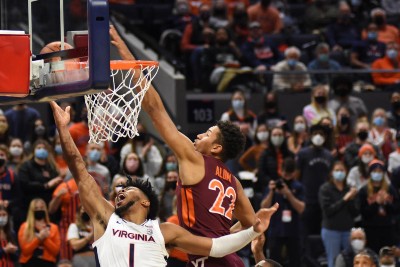
Virginia Tech, a trendy pick to contend in the ACC this season, limped out to a 2-7 start in conference play, including a 54-52 loss at Virginia on Jan. 12.
A buzzer-beating home loss to Miami two weeks later seemed to light a fire under the Hokies (15-10, 7-7 ACC), who have run off five wins in a row since.
No world-beaters in that list – Florida State, the first victim, is in the throes of a six-game losing streak, Georgia Tech is 14th in the conference, Pitt is 11th, Syracuse is at .500.
All you can, of course, is beat who they put in front of you.
Virginia (16-9, 10-5 ACC), for its part, has won four in a row and five of its last six and is now just a game and a half back of the leaders in the ACC.
Virginia Tech rotation
The Hokies run through 6’9” senior Keve Aluma (15.5 ppg, 6.2 rebounds/g, 52.6% FG, 28.8% 3FG), whose numbers from three are down from last year (35.1% in 2020-2021), but he is doing a lot more in the mid-range (shooting 49.5 percent on two-point jumpers, up from 43.7 percent a year ago).
Around Aluma in the paint, coach Mike Young has a bevy of perimeter shooters. The Hokies are shooting 41.5 percent from three, second nationally, led by 6’3” junior Hunter Cattoor (10.6 ppg, 44.9% FG, 45.7% 3FG, on a team-high 5.6 attempts from three per game).
Darius Maddox, a 6’5” sophomore, shoots 52.3 percent from three off the bench (5.5 ppg, 14.9 minutes/g).
Also need to watch out for 6’0” senior Storm Murphy from three (8.4 ppg, 45.1% FG, 36.7% 3FG).
Nahiem Alleyne, a 6’4” junior, scores 10.2 points per night, and after a rough start, his shooting is improving (36.8 percent from the field, 38.2 percent from three).
Justyn Mutts, a 6’7”, 230-pound senior, is a beast in the post (10.4 ppg, 7.6 rebounds/g, 55.2% FG, 66.1% on shots at the rim).
Depth in the post comes from 6’9” sophomore David N’Guessan (4.0 ppg, 3.0 rebounds/g, 14.3 minutes/g) and 6’10” junior John Ojiako (2.5 ppg, 1.9 rebounds/g, 6.8 minutes/g).
One other guy gets rotation minutes – 6’1” freshman Sean Pedulla (3.5 ppg, 11.5 minutes/g).
Matchups
Kadin Shedrick (6.3 ppg, 5.3 rebounds/g, 56.9% FG) gets Aluma, a tough matchup, given Aluma’s versatility.
Shedrick needs to avoid early foul trouble – he averages 5.0 fouls per 40 minutes – because backup center
Francisco Caffaro (4.8 ppg, 4.4 rebounds/g, 53.8% FG) earned his starting job at the five spot with his performance in the win over the Hokies last month, scoring 16 points and pulling down nine rebounds in 31 minutes off the bench, after Kadin Shedrick (6.8 ppg, 5.1 rebounds/g, 2.3 blocks/g, 62.7% FG) got into early foul trouble.
Aluma still ended up with a game-high 22 points, but he needed 20 shots to get them.
Aluma is a tough cover on pick-and-rolls (29 usages, 64.0% FG, 76.0% AFG, 1.448 PPP), backdoor cuts (91 usages, 66.7% FG/AFG, 1.341 PPP) and post-ups (95 usages, 49.4% FG/AFG, .937 PPP).
Virginia runs its offense through 6’7” power forward Jayden Gardner (14.9 ppg, 6.8 rebounds/g, 51.7% FG), but the guy likely to guard him most of the night, Mutts, is a tough low-post defender (allowing .830 PPP, per Synergy Sports).
Gardner struggled mightily in the first matchup, scoring just four points on 2-of-9 shooting.
Aluma rates as a below average defender, allowing .919 points per possession, so you might see Tony Bennett try to get looks for Caffaro in the post early.
Alleyne gives up .855 points per possession. Alleyne is likely to get Armaan Franklin (11.9 ppg, 40.4% FG, 25.6% 3FG).
Franklin had 15 points on 5-of-11 shooting, 1-of-4 from three, in the win over Tech in January.
The backcourt has Cattoor, Tech’s best perimeter defender (.725 PPP) on Virginia point guard Kihei Clark (10.0 ppg, 4.1 assists/g, 41.2% FG, 38.0% 3FG), and Murphy (.787 PPP) checking Reece Beekman (7.7 ppg, 4.9 assists/g, 43.6% FG, 34.0% 3FG).
The stakes
Odd thing about this game from a bracketology perspective – the game is a Q1 opportunity for Virginia because somehow, some way, the NET rating system has Virginia Tech at 39 nationally.
This silly NET has Virginia, with a better record, comparable strength of schedule (VT: 98, UVA: 105), more Q1 wins (UVA is 2-4 vs. Q1 teams, Tech is 0-5) all the way down at 77, which means this is a Q3 game for the Hokies.
The ESPN BPI has Tech favored by 7.1 points. KenPom.com is projecting a 64-58 Virginia Tech win.
Story by Chris Graham










